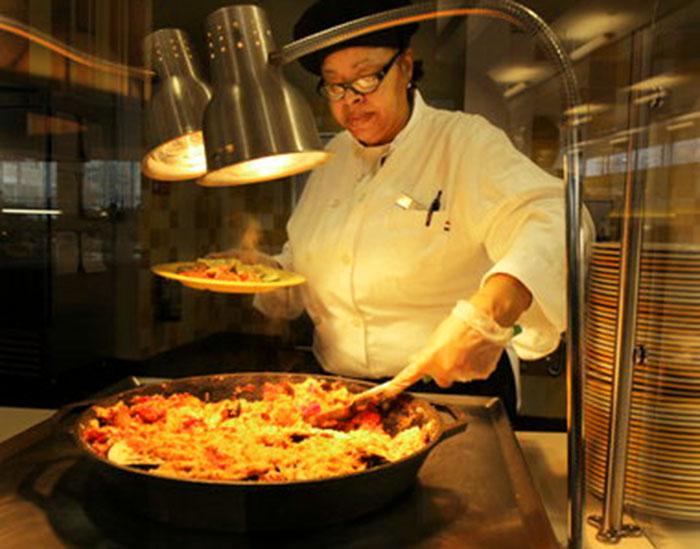For many students, the “freshman 15” is a big concern; the dining halls give them access to food at all times of the day and it is solely their responsibility to eat healthy food. However, for other students, not having any food to eat on campus is a concern.
According to CBS News, one in three people in the United States is lactose intolerant and six percent of the US population has a gluten allergy. Since these statistics have come out, more and more dining halls across the nation are serving gluten-free or soy options at meals. Case Western Reserve University has started a similar program, hiring a residential dietitian to serve the campus.
Dayna Einheit, R.D., was hired Aug. 21 by CWRU’s on-campus catering service, Bon Appétit. After graduating from the Ohio State University with a major in nutrition and a minor in business, Einheit went on to complete her dietetic internship in Washington D.C., completing rotations between public schools, the Farm-to-School Network, Georgetown University Hospital, and the Children’s National Medical Center.
After holding an internship through Morrison Management Specialists, another sector of Compass Group, the overseeing company for Bon Appétit, Einheit heard about the position at CWRU through her internship director. Before then, Bon Appétit had never had a registered dietitian on the CWRU campus.
As the residential dietitian, Einheit works with students requiring special diets and acts as the liaison between the student, chefs, managers, and foodservice personnel. She also provides one-on-one counseling sessions with students on any nutritional and dietary needs.
Any student with a dietary restriction, whether he or she is vegetarian, vegan, allergic to nuts, etc. can talk to Einheit and work out how to receive special meals from the dining halls. Each dining hall, Leutner and Fribley, has specific chefs solely dedicated to make food for students with dietary restrictions.
“I knew going into my dietetic internship that I wanted to work with adolescents and young adults. It’s an age where developing a healthy relationship with food is very important and involves a conscious choice you must make every day,” said Einheit. “College students are very susceptible to distorted views on food. Whether it is overeating, under-eating, dietary restrictions, distorted eating patterns, making unhealthy food choices, food insecurity, etc., your relationship with food will follow you your whole life. It affects your physical health and your mental well-being. I hope to help students overcome their differences with food, and find the balance they need for a healthy future.”
Einheit is also responsible for overseeing all dining service projects related to the health and wellness of students. This includes ensuring information provided for the new Enhanced Nutrition Information program is accurate and meets all labeling requirements.
In addition to the Enhanced Nutrition Information program, Einheit is also responsible for implementing Bon Appétit’s Food for Your Well-Being program. Each month a new nutrition topic is the focus of student dining; October’s theme is “Plant Based Protein: Not Just for Vegetarians.”
“The biggest challenge at the moment is making sure all the nutritional information being put on food items is correct,” said Einheit. “Every staff member plays a part in ensuring accurate nutritional information is provided to you and takes collaboration from recipe development to portioning food on your plate.”
The Food for Your Well-Being program is not the first program Bon Appétit has implemented in the dining halls, though. Bon Appétit has participated in the Eat Local Challenge, an event that required chefs to make meals from scratch using only ingredients that came from within 150 miles of the kitchen. They have also continued to use locally-grown foods as frequently as possible in the dining halls.
On Apr. 19, Bon Appétit only served “carbon conscious” meals in order to promote and inform students of the environmental impact of their meals. “Low Carbon Diet Day” was created by Bon Appétit to minimize its carbon footprint and to inform students of the commitment to keep the footprint lower for five years.
While those programs were only temporary, Einheit’s special diet and counseling services will be available permanently to any student who wants to take advantage of them.
“My favorite part of my job is the diversity of the students and their appreciation for everything the dining staff does. Every student comes with different food preferences and dietary needs, meaning students keep the days interesting and our chefs inspired,” said Einheit. “The students are also always thankful, outgoing, and leaving positive comments about the food and their dining experience. We appreciate you just as much as you appreciate us.”


